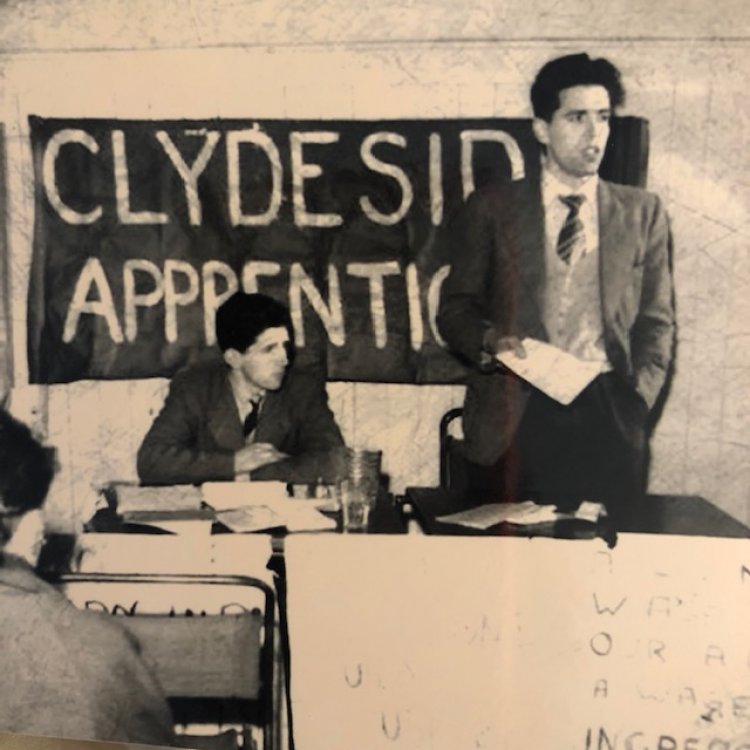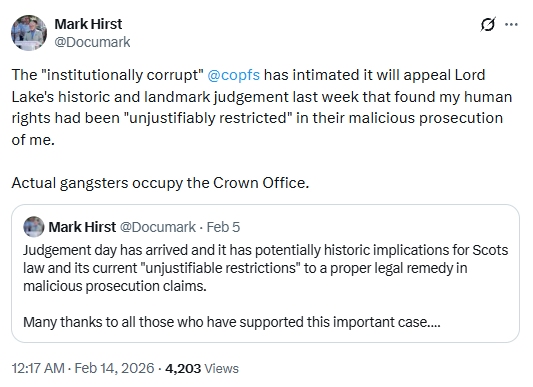Jimmy Reid: All 20th century history touched his life – and ours: Depression, War, Communism and Nationalism.
2021 marks half a century since he stepped onto that platform, and declared a work-in at Upper Clyde Shipbuilders. Jimmy strategised a radical concept to combat the axing of the industry on the Clyde. His rectorial address at Glasgow University, the following year, on the theme of alienation was a clarion call for humanism. In this book Jimmy reveals how that tour de force made its way into the New York Times.

'WALKING with History' is an apposite title for a book on Jimmy Reid.
When I first met Jimmy Reid, his full story had yet to be told.
Now, my forthcoming book reveals the Scottish hero in his own words.
2021 marks half a century since he stepped onto that platform, and declared a work-in at Upper Clyde Shipbuilders. Jimmy strategised a radical concept to combat the axing of the industry on the Clyde. His rectorial address at Glasgow University, the following year, on the theme of alienation was a clarion call for humanism. In this book Jimmy reveals how that tour de force made its way into the New York Times.
I worked with Jimmy on his magazine Seven Days. I was studying journalism, but learned more ensconced in the upstairs bar with him and the production journalist Bob Houston. Bob was a Scot who’d edited The Miner, the NUM’s official paper, through the tumultuous 1970s and 80s.

When Seven Days closed I called and suggested a series of interviews for my course work. His response: “You want to talk about things, son? Okay.” So, we talked about things, and the people he’d joined in struggle: Paul Robeson, Willie Gallacher, Hugh MacDiarmid, Tony Benn. The dissenting voices too: William F. Buckley, Malcolm Muggeride, National Enquirer founder Generoso Pope Jr who boasted about his CIA activities in post-war Italy.
During the conversations, Blair’s New Labour project was underway. The abandonment of Clause 4 engaged Jimmy in a battle for the soul of the party. He intimated he’d remain in the party until a Scottish Parliament was secured. His past taught him that Labour’s commitment to home rule was always conditional. When the SNP made electoral gains, Labour promised to legislate for an autonomous assembly. When support for the National movement ebbed, the issue was quietly dropped. Jimmy’s opposition to New Labour was a deeply-felt revulsion at the adoption of “Thatcherite economics,” and the continuation of a political creed that was alien to the Scottish people.
His analysis was cerebral, but also stemmed from childhood experiences. During our conversations, beginning in 1994, Jimmy spoke of the suffering his parents endured. The past was prologue. Glasgow was the second city of an empire where riches flowed into London. On Clydeside infant mortality rates were on a par with Third World levels. The system permitted innocents to die. Three of Jimmy sisters died in infancy, and he wore that emotional wound till his dying hour. He spoke of how anguish over the indignities around him was converted into outrage. A strike of apprentices on Clydeside spread Scotland-wide and established him as a Young Turk of the Young Communist League, and his engineering union, the AEU.
The best shop stewards were Communists and studying Marxist theory developed his commitment to the “Higher philosophy that is Communism.”
A project which began as student course work grew into a fascinating odyssey of insights.
Jimmy was an iconoclast, of course. An uncomfortable presence in the inner politics of any party. The election of Alex Salmond to the leadership of the SNP in 1990 marked a watershed. He displayed no deference for political institutions standing in the way of nationhood. The old certainties were crumbling under his combative case for self-government.
Jimmy left the Labour Party in 1998 convinced that it was “No place for a social democrat let alone a democratic socialist.” The parliament had come but with it came a recognition by Jimmy that progressive legislation incurred the displeasure of London Labour. Then came the obscenity of Iraq. Not only had the party he’d joined performed ideological somersaults, the Scotland of fond memory had changed. There’d been blighted lives. But there had been fight.

The litany of industrial wreckage had shattered his heart. His head told him deindustrialisation was wilful. Singers in Clydebank, Linwood, Gartcosh, Ravenscraig. And then the shipyards he’d fought to save. How many more sacrifices would be endured to a rapacious system?
When we resumed the autobiographical recordings, Jimmy had retired to Rothesay. He was more reflective but fiercely forward-looking too. The recollections had an added poignancy. The last of them took place three months before his death in August 2010. Five years before Alex Salmond had signed him up the SNP.
He had always been a Nationalist. National identity mattered as you couldn’t be an Internationalist without being a Nationalist.
He’d quote a poem from Punch Magazine: “Under Mr de Valera, Ireland changed its name to Eire. Britain strictly keeps its name. It’s called England just the same.”
The Labour Party and the trade unions were once indivisible.
My boss and friend Harry Conroy had been general secretary of the National Union of Journalists. The first political party he joined as a young man was the SNP.
Harry, a kind and generous benefactor to many people, segued from SNP to Labour during his ascent within the NUJ. Although Hugh Wyper – a Communist Party stalwart – brought him onto the General Council of the Scottish Trades Union Congress, Harry was the only Nationalist who’d attained that position.
Last year, Len McCluskey, leader of the Unite union, remarked that most of his Scottish officials were SNP members. As a consequence, he said, Unite would maintain a neutral position on independence. The process has been slow but inexorable. Jimmy’s trajectory has been replicated by thousands who held that the Vision Splendid would usher in an age of social justice.
That vision remains, but the means to achieve it involves Scotland and the dawn of a new Enlightenment.
Jimmy Reid: Walking with History, charts political and social history through the life of one remarkable man. A life as relevant today as it has ever been.
What's Your Reaction?










































